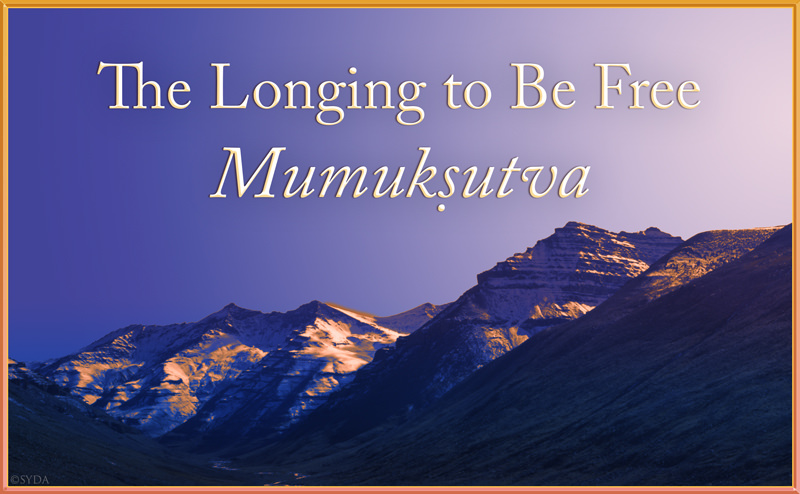The Longing to Be Free, Mumukshutva

An Exposition by Ben Williams
In our sojourn through the world, we sometimes become aware of a feeling that there is something more—more to being human, more potential to life—than we can currently grasp. This feeling may also be accompanied by an intuitive sense that even if we achieve all the conventional goals we have set for ourselves, this will not culminate in true fulfillment.
What is it, then, that we truly seek? We seek a happiness that doesn’t fade. We long for an inner freedom that is unwavering. This calling from within may be subtle, but it is significant. This feeling that there is more to life corresponds to a pure impulse to awaken to the vastness, the boundlessness, of our own true nature.
The Siddhas who expound the philosophy of Shaivism say that this longing is inherent to Consciousness itself. They teach that the moment all-pervasive Consciousness decides to create, it freely relinquishes its freedom and plenitude in order to enact the drama of this universe. In this way, Consciousness, just like an actor, freely assumes the role of the individual soul. Through all of its cycles of birth and rebirth, the soul carries the memory of its true nature as expansive and blissful Consciousness, secretly embedded deep within the heart. When this memory of our own infinite nature awakens, we become impelled to regain the pristine freedom and expansive joy that underlies and animates all of life, that wondrous Awareness in which everything is united.
The turning point is when we become conscious of this intrinsic yearning, which is itself a spark of that which we yearn for. The Sanskrit term for this inner calling is mumukṣutva, the ardent desire for liberation, the longing to know the Truth.
The Crest-Jewel of Discrimination, one of the most concise and penetrating works on Vedānta philosophy ascribed to Śrī Śaṅkarācārya, teaches:
दुर्लभं त्रयं एवैतद् देवानुग्रहहेतुकम् |
मनुष्यत्वं मुमुक्षुत्वं महापुरुषसंश्रयः ‖durlabhaṁ trayam evaitad devānugrahahetukam |
manuṣyatvaṁ mumukṣutvaṁ mahāpuruṣasaṁśrayaḥ ‖These three things are exceptionally rare and result from God’s grace: a human birth, the longing for liberation, and the refuge of a great being.1
In the philosophical traditions of India, a human birth is considered a rare and immeasurable gift because human beings have the capacity to awaken to the unbounded freedom of Consciousness. And becoming aware of this longing for freedom represents a major turning point in a human life. Added to these two incalculable blessings, then, is the paramount act of divine grace through which we encounter, and ultimately take refuge in, a true Guru. For such a fully realized Master, a sadguru, is empowered to bestow the extraordinary gift of divine initiation, śaktipāt-dīkṣā.
Śaktipāt-dīkṣā directly awakens the divine energy, Kuṇḍalinī Śakti, which then unfolds through our spiritual discipline under the grace and protection of the Master. This unfolding—or expansion—of our inner power quickens the longing for liberation and accelerates our progress on the path. In this way, the spiritual seeker gradually becomes ripe—ready to attain perfect knowledge of the Self.
The teachings of the great Siddhas continually extol the importance of recognizing this longing. In Gurumayi’s own words:
Mumukshutva is the determination to attain liberation. It is this burning desire that makes a person seek the Truth. Such a person is called a mumukshu, one who is willing to sacrifice himself in order to know the greater power within, to acquire divine knowledge.
A true mumukshu wants to break through all the barriers that keep him chained to his own limitations. With a longing for freedom that can never be forgotten, he is determined to become one with the Truth. So even a tinge of ego is painful to him. Tirelessly, a mumukshu seeks to abandon himself to the will of God.
Be a mumukshu: yearn with your whole heart to become one with the great Truth.2
The awareness of being a mumukṣu is a sign that our sādhanā is naturally unfolding, that our spiritual discipline is coming to fruition. Although this longing can be experienced in varying degrees and in different forms, it often manifests as an inner resolution to break free of the barriers that limit us and to live wisely, compassionately, fearlessly, and from a place of great freedom. A pure-hearted dedication to liberation establishes a true north, which puts the broad spectrum of our disparate motivations into context and shines a light on those places in ourselves that are out of alignment with this goal.
How can this longing be cultivated? The resolve to become free can manifest as the desire to dedicate oneself to the spiritual practices that lead to freedom. We acquire great interest in meditation, we develop a taste for the sweetness of chanting the divine name, and we happily take up the repetition of mantra. We ply ourselves to the study of the illumined words of the knowers of the Truth and to having the darśan of great beings. We reflect deeply on our life experience and rediscover our genuine worthiness. Rather than shrinking from life, we understand that freedom is found in our ability to acknowledge Consciousness in everything that arises, to learn from each situation; doing so emboldens us. We realize that by facing and moving through life’s difficulties, we are able to expand our experience of freedom. In various ways we eagerly engage in that which brings us closer to satsang, inner communion with that which is Real.
The journey of becoming established in the recognition of our own divinity demands effort, courage, and, as Gurumayi mentions, sacrifice. The force of this longing for freedom is, however, joyous and generates an exhilarating sense of infinite possibility. As mumukṣutva expands in our heart, we develop true fortitude. The bold impulse to be free, in and of itself, acts as a source of strength.

1 Vivekacūḍāmaṇi 3; English translation © 2018 SYDA Foundation.
2 Swami Muktananda and Swami Chidvilasananda, Resonate with Stillness: Daily Contemplations, (South Fallsburg, NY: SYDA Foundation, 1995), May 4.

